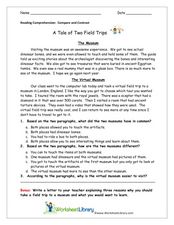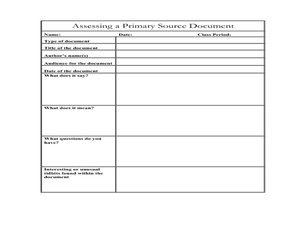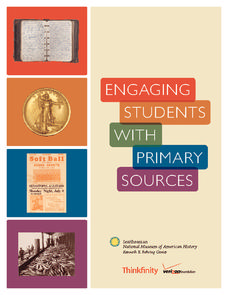Curated OER
Living History
Students analyze how historians are trying to keep history alive and preserve it for generations to come. They view some schools trying to save an entire culture and language from extinction. Students participate in history preservation...
Curated OER
Who Could Ask for Mores?
Young scholars enjoy hands-on learning experiences. In this Victorian Britain lesson, students may visit the Victoria and Albert Museum, the Shambellie House Museum of Costume, or the Museum of Costume of Bath online or in-person to...
Curated OER
Museo Mural Diego Rivera
Students take a virtual tip to the Mural Museum and examine the Museo Mural Diego Rivera. Students Identify fifteen people in the mural and research them to find out more about their lives. They discover the history of the painting and...
Curated OER
Heroes and Hoplites for a Day
Students consider the accomplishments of the Greeks. In this ancient Greece lesson, students take a closer look at Greek artifacts, history, and culture as they visit the suggested museums and their websites.
Curated OER
A Tale of Two Field Trips
In this museum instructional activity, students read about visiting a museum and a virtual museum and answer multiple choice questions about them. Students complete 3 questions.
Curated OER
INTRODUCTION AND WEEK ONE
Eleventh graders use a variety of resources to research and compile information on the Underground Railroad. They work in small groups and individually, to discuss and exchange ideas as they construct the exhibit that they display in...
Curated OER
Out & About: The Egyptians
Students discover the accomplishments of the Egyptians. In this ancient Egypt lesson, students take a closer look at Egyptian contributions to modern society as they visit the suggested museums and their websites.
Curated OER
Then, Now, and Tomorrow
Students will use this unit to investigate the past, present, and future of the architecture and plan of New York's Lower East Side. Students will research the history of the Lower East Side neighborhood in photographs used from the...
Curated OER
The People of Kansas: Who Are They and Why Are They Here?
Students examine the settlement patterns of the Kansas Territory. In this Kansas history lesson, students analyze primary documents from the pioneers in the territory. Students write letters or perform skits that feature their findings.
Curated OER
Elders as Resources
Students participate in an oral history project where they interview a person's valuable insights to their life stories. They gain personal experience in an interactive process that brings history alive all over again. Students conduct...
Curated OER
The Anasazi
Sixth graders investigate and determine the origins of the ancient Anasazi who inhabited present-day Utah and the Four-Corners-Region, after receiving direct instruction and carrying out activities in cooperative group settings. They...
Curated OER
The Anasazi
Students investigate and determine the origins of the ancient Anasazi who inhabited present-day Utah and the Four-Corners-Region.
Curated OER
Dorothea Lange and the Relocation of Japaneses Americans
Students analyze Dorothea Lange's photographs about Japanese American relocation. In this art and history lesson, students analyze a photograph about the relocation of Japanese Americans. Students discuss the impact of governmental...
Curated OER
Diversity
Fourth graders discover cultural heritage by investigating the Aboriginal community. In this Canadian History lesson, 4th graders identify the First Nations of Canada and research them using an atlas and the web. Students create a First...
Curated OER
Yerbas y Remdios: A New Look
Students explore human health by participating in a medicine class activity. In this herbs instructional activity, students identify plants which Native Americans used throughout history to cure illnesses. Students research specific...
Curated OER
Introduction to Native Americans Thematic Unit
Students consider different cultural viewpoints. In this Native American history lesson, students examine artifacts and then conduct research on selected Native American tribes.
Curated OER
Urbanization
Learners examine the impact of urban change. In this Indiana history activity, students read excerpts of The World Does Move by Booth Tarkington and then research the noted Web sites about the urbanization of Indianapolis. Learners then...
Curated OER
Right About Now… and Then
Learners discuss significant figures in music history and read an article about the Smithsonian's Hip-Hop exhibit. In groups, they develop and curate an exhibition of hip-hop music and history using artifacts that represent relevant...
Smithsonian Institution
Engaging Students with Primary Source
Young historians learn how to analyze various forms of primary source documents. The colorful packet is packed with all you need to engage kids in this essential skill.
Constitutional Rights Foundation
Harriet Tubman and the End of Slavery
Harriet Tubman saved hundreds from slavery through what was called the Underground Railroad. Teach learners about her amazing accomplishments through the article that uses effective direct instruction. After reading, scholars break into...
Curated OER
Mesopotamian Gods and Goddesses
Each of the Mesopotamian Gods and Goddesses are associated with a city and a symbol. This hand out is intended as a quick reference guide to help learners recall 12 of the most prominent of these figures.
National First Ladies' Library
Slavery in the Beginning: Creating a Virtual Museum
Social studies learners explore slavery in the American colonies from 1607 to the Revolutionary War. In groups, they explore a PBS website and a virtual museum. Using these websites and other online resources, learners create their own...
Curated OER
Traveling Museum Book
Students research the Ndebele tribe. In this research project, students work in groups to create a traveling museum about the Ndebele tribe.
Curated OER
Memorable Museums
Second graders describe the impact of certain figures in United States history, including Thomas Jefferson, Meriwether Lewis, and iam Clark. They describe the general features of a community as well as specific features of their own...

























